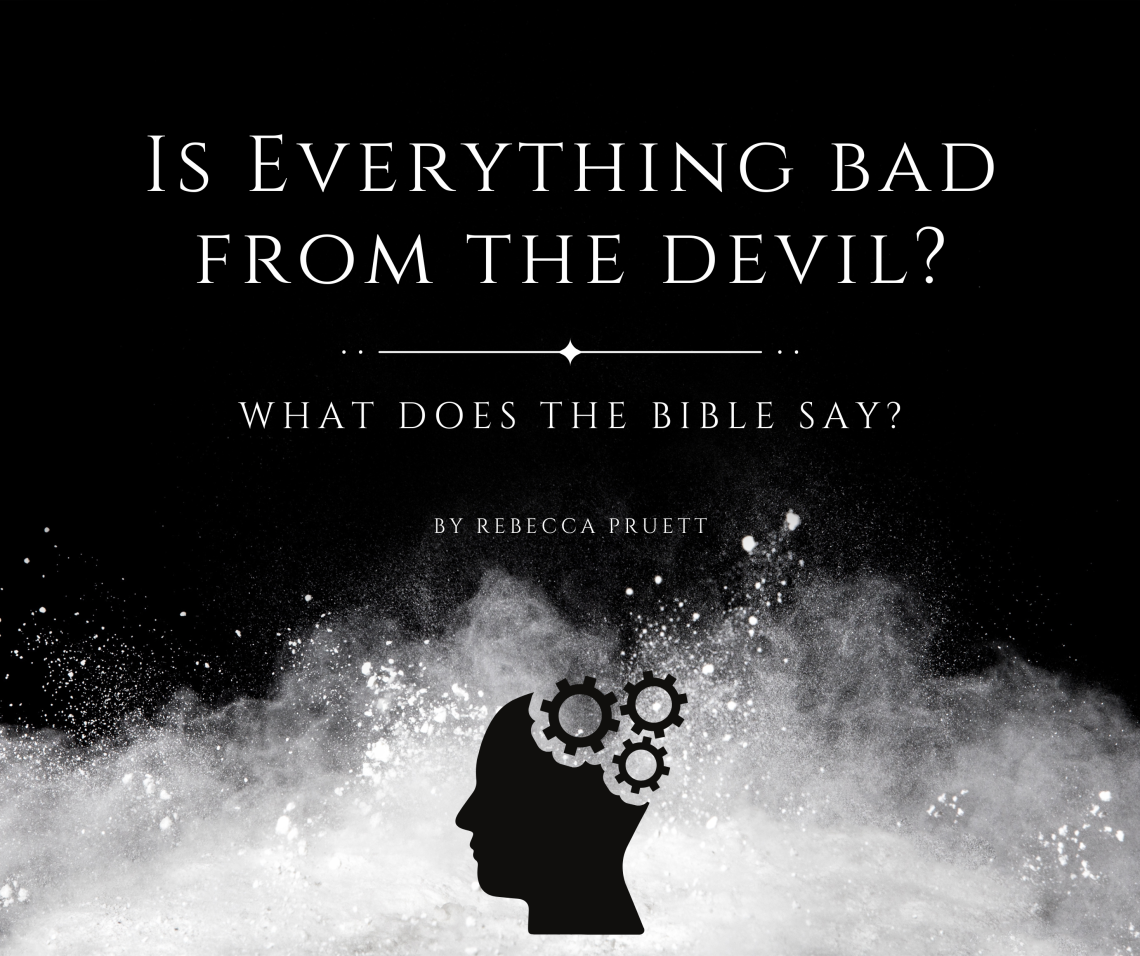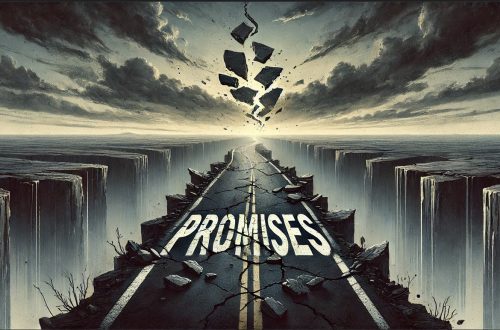
Is Everything Bad from the Devil? What Does the Bible Say?
About six years ago, I received the kind of discipleship depicted in Matthew 23:15.
In that passage, Jesus rebuked a group of hypocrites, saying:
“For you travel across sea and land to make a single proselyte, and when he becomes a proselyte, you make him twice as much a child of hell as yourselves.”
You could say that I definitely became that two-fold child of hell as a result. Under that instruction, I adopted and applied, and promoted certain teachings that fill my heart with the deepest form of regret.
I remember someone asking one “discipling” us, “How did you become so confident?”
His ability to overcome natural hesitations was admirable—walking up to anyone and praying for them boldly, on the spot.
He said it was easy—it all boiled down to his certainty about who was behind the circumstances in their life.
“If it’s bad, I know that’s the devil, so it’s easy to walk up and take authority.”
Sadly, regretfully, devastatingly, my black-and-white brain loved this. 😩
Bad = Devil. Good = God.
As a “Kingdom Christian,” (I have a visceral reaction to this term now, BTW) I was supposed to fight the devil, and this framework simplified everything. Especially since faith teachings create heaps of cognitive dissonance. This formula alleviated the mental stress behind all of the “what-ifs” that plagued my mind—What if I give them false hope? What if I’m pointing them in the wrong direction? What if I’m fighting against God? What if this isn’t actually God’s will?
It eliminated the need for those questions and allowed me to override apprehensions and internal conflict.
So What’s the Big Deal? Let’s unpack that now. ❤️
The idea that everything bad—sickness, suffering, loss, hardship, inconvenience—can be lumped into one pot and blamed on the devil may seem appealing, but it actually causes catastrophic distortion to the Gospel message. Here’s why.
On one hand, if we embrace this idea, it makes things very simple for us. Essentially, when we encounter something we don’t like, all we have to do is “fight back.” Pray harder! Believe more! Take authority! If this is the case, outcomes ultimately rest in our hands. We just take the bull by the horns and whip it into shape. No need to wrestle with theological complexities. No need to ask difficult questions. No need to acknowledge the sovereignty of God over suffering.
Life is just one big giant cosmic battle of good vs. evil. Just fight!
On the other hand, if we attribute all discomfort to the work of Satan, it erases the reality of God’s judgment over sin.
It diminishes the significance of the Fall and the curse that God Himself placed on creation.
It blinds people to biblical reasons for suffering and leads them to give Satan more credit than he actually deserves.
Let’s Take a Look at the Fall:
To understand why suffering exists, we have to go back to Genesis 3—to the moment Adam and Eve disobeyed God in the garden.
When they sinned, God Himself pronounced judgment, cursing humanity, the earth, and even the serpent:
And to Adam he said, ‘Because you have listened to the voice of your wife and have eaten of the tree of which I commanded you, “You shall not eat of it,” cursed is the ground because of you; in pain you shall eat of it all the days of your life; thorns and thistles it shall bring forth for you, and you shall eat the plants of the field. By the sweat of your face you shall eat bread, till you return to the ground, for out of it you were taken; for you are dust, and to dust you shall return.’” — Genesis 3:17-19 (The full curse begins at vs. 14)
This is what theologians call the Adamic Covenant or the Curse of the Fall—God’s righteous judgment upon sin. The entrance of death, disease, suffering, and toil into the world was not the work of Satan. This was put in place by God—a divine judgment upon creation.
Thorns and sweat and pain and death are unpleasant, but Satan didn’t establish these things. God did. In His holy, righteous, judgment, He sovereignly orchestrated punishment for sin.
Yes, Satan works within the fallen world to deceive and destroy (John 8:44, 1 Peter 5:8) but the world is fallen, and broken, and we suffer as a direct result of the Adam’s fall and God’s judgment upon all mankind. To claim that all suffering is a work of the devil allows men to circumvent some of the most important aspects of the Gospel:
Man sinned. Sin requires judgment. God is a just and righteous judge. God is Sovereign.
Ideas Have Consequences
Its human nature to take an idea that sounds good and just run with it. I think that’s what I did initially with this whole concept. It sounded good and I ran with it. But all ideas come from somewhere, and all ideas lead us somewhere. When cognitive dissonance started to unravel me, and I couldn’t mentally bear the load of these teachings any longer, I did some digging into where this idea came from. The truth is there’s actually a diabolical underbelly to this idea that everything bad comes from the devil. This is what I discovered is being taught by leaders in the “faith movement,” underpinning this idea.1
According to them:
➡️God gave Adam dominion over the earth. ➡️ When Adam fell, the earth ‘legally’ became Satan’s dominion. ➡️ God couldn’t do anything about Satan and his bad behavior because the earth was ‘legally’ his.➡️ Jesus died to ‘legally’ restore the dominion of the earth back to man. ➡️ Once ‘saved’ man reclaims his ‘legal’ dominion of the earth and his supernatural ‘divine rights’ and fights back over his ‘dominion.’ ➡️ God doesn’t do anything because the power to defeat it was provided through Christ—if there’s a problem, He expects you to take care of it. ➡️ You know what God’s will is so He’s imparted His sovereignty to you to execute His will on earth.
🚩 Yikes! 🚩
Can you number the errors? I tried, but I can’t count that high. 🫠
The Bible doesn’t say these things! But you can see how this framework supports the idea that “all bad things come from Satan.” In their view, 🚨Satan has the upper hand and God’s taking a nap, and we’re in charge.🚨 It’s a full-blown slap in the face to the Gospel and the sovereignty of God!
Here’s what you need to understand:
1. God is Sovereign
The most dangerous consequence of the “Bad = Devil, Good = God” mindset is that it rejects God’s sovereignty over all things—including suffering.
Scripture repeatedly affirms that God is the one who presides over both well-being and hardship. Check out these verses:
| Deuteronomy 32:39 See now that I, even I, am he, and there is no god beside me; I kill and I make alive; I wound and I heal; and there is none that can deliver out of my hand. | Kills & Makes Alive Wounds & Heals |
| Amos 3:6 Is a trumpet blown in a city, and the people are not afraid? Does disaster come to a city, unless the Lord has done it? | Causes Disasters |
| 1 Samuel 2:6-7 The Lord kills and brings to life; he brings down to Sheol and raises up. The Lord makes poor and makes rich; he brings low and he exalts. | Kills & Brings to Life Brings down & Raises Up Makes Poor & Makes Rich Brings Low & Exalts |
| Isaiah 45:7 I form light and create darkness; I make well-being and create calamity; I am the Lord, who does all these things. | Forms light & Creates Darkness Makes Well-Being & Makes Calamity |
| Exodus 4:11 Then the Lord said to him, ‘Who has made man’s mouth? Who makes him mute, or deaf, or seeing, or blind? Is it not I, the Lord?’ | Makes people mute, or deaf, seeing, or blind. |
| Daniel 4:32-34 You shall be driven from among men, and your dwelling shall be with the beasts of the field… Immediately the word was fulfilled against Nebuchadnezzar. He was driven from among men and ate grass like an ox… At the end of the days I, Nebuchadnezzar, lifted my eyes to heaven, and my reason returned to me, and I blessed the Most High and praised and honored him who lives forever. | Makes people insane and sane |
| Lamentations 3:37-38 Who has spoken and it came to pass, unless the Lord has commanded it? Is it not from the mouth of the Most High that good and bad come? | Causes good and bad |
| 2 Chronicles 7:13-14 When I shut up the heavens so that there is no rain, or command the locust to devour the land, or send pestilence among my people, if my people who are called by my name humble themselves, and pray and seek my face and turn from their wicked ways, then I will hear from heaven and will forgive their sin and heal their land. | Causes drought, plagues, pestilences and reverses them. |
These verses are impossible to reconcile with the idea that God only sends good things and Satan sends the bad. God is sovereign over everything.
2. God’s Wrath and Judgment are Essential to the Gospel
If we adopt the belief that everything bad comes from Satan, we strip the Gospel of its central message: that sin incurs the righteous wrath of God. Our fallen, broken, suffering world is a direct result of Adam’s sin, and born in sin, we all partake of this righteous judgment.
The wrath of God against sin is not a work of Satan; it is an essential attribute of God’s holiness. If we believe that everything bad is from the devil, we fail to see that judgment is necessary, and that justice is righteous. Without the reality of God’s wrath, there is no need for the cross, no need for redemption, and no real hope for salvation.
3. Satan is NOT sovereign
Satan is not an equal rival to God. He is a created being, operating only within the limits that God allows. Even when Satan causes harm, he does so by permission.
Consider Job:
“And the Lord said to Satan, ‘Behold, all that he has is in your hand. Only against him do not stretch out your hand.’ So Satan went out from the presence of the Lord.” (Job 1:12)
Satan had to ask permission before afflicting Job. He wasn’t operating independently. He was acting within God’s sovereign will. The same is true in the New Testament when Jesus tells Peter:
“Simon, Simon, behold, Satan demanded to have you, that he might sift you like wheat, but I have prayed for you that your faith may not fail.” (Luke 22:31-32)
Again, Satan does nothing apart from God’s permission. This means that while Satan plays a role in deception and destruction, God is still in control. We may not always understand why we experience the things we do, but we don’t have to. He’s God, and we are meant to trust Him, and believe that He ultimately uses our difficulties for His glory. (Isaiah 46:9-10; Romans 8:28)
What Does the Bible Say Are Causes of Suffering?
| Some suffering is part of God’s general curse on creation due to sin. | Genesis 3:17-19; Romans 8:20-22 |
| Some suffering is a direct result of personal sin | Do not be deceived: God is not mocked, for whatever one sows, that will he also reap. (Galatians 6:7) |
| Some suffering is divine discipline for believers. | For the Lord disciplines the one he loves, and chastises every son whom he receives. (Hebrews 12:6) |
| Some suffering is for the testing and refining of believers. | Count it all joy, my brothers, when you meet trials of various kinds, for you know that the testing of your faith produces steadfastness. (James 1:2-3) |
| Some suffering is due to satanic attack, but only within the limits of God’s permission. | Job 1:12; Luke 22:31-32 |
| God’s ultimate purpose in suffering is to bring about His glory and our good. | And we know that for those who love God all things work together for good, for those who are called according to his purpose.” (Romans 8:28) |
Conclusion: The Truth Matters
The belief that all bad things come from the devil may be comforting in its simplicity, but it isn’t biblical. The reality is that God Himself brings judgment, discipline, and trials according to His righteous will. When we fail to acknowledge this, we reject a fundamental truth of Scripture—that God is just, that His wrath is real, and that Christ bore that wrath for us on the cross.
A proper understanding of suffering leads us to true hope, not in the idea that we can “rebuke” every hardship, but in the confidence that God is sovereign over all things. He is working out His purposes—even in pain, even in loss, even in the hard things we don’t understand.❤️
For the believer, suffering is not a sign of defeat but a reminder that we are living in a fallen world where God’s justice is real, His discipline is loving, and His redemption is sure. We don’t have to figure it all out. We don’t have to know all the intricate details of why we struggle, or suffer, or even just have a bad day—we are simply meant to trust that God is sovereign, ruling over all, and that in His goodness, He will work all things together for His glory and divine purposes.

- Dominion Theology is taught by Curry Blake, E.W. Kenyon, John G. Lake, Kenneth Hagin, Kenneth Copeland, C. Peter Wagner, Bill Johnson, & Jesse Duplantis, to name a few. ↩︎




